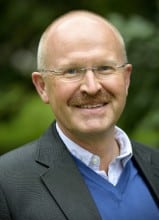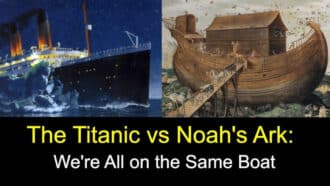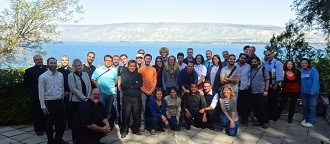Director of the Swedish Theological Institute
Interview by Siiri Bigalke of The Interfaith Center for Sustainable Development and Recorded Daniel Altman

The text below is the full transcription of the interview – a condensed version appears in the video above.
Transcription of the Interview with Dr. Håkan Bengtsson, Director of the Swedish Theological Institute
Siiri: So we’ll first have you introduce yourself, tell us about your spiritual background, and how you found the connection between sustainability and your theological work.
Håkan Bengtsson: So my name is Håkan Bengtsson, I am Swedish. I am Lutheran Christian. I am 52 years old. I have two grown up children. I guess I have to explain first a little why I became the director of the Swedish Theological Institute here. Over thirty years ago I was a student here. I had the benefit of coming to Jerusalem and meeting the plurality here. Basically I got hooked. I thought it was such an interesting and challenging city and this is the first time in my life when I come to the dialogue as to communicate with other religious traditions; it appealed to me that this was, in a way, a very sustainable way of interacting with other interfaith traditions, rather than the tradition of an imperialisticway of telling that we are right. So I learned a lot from that and this is why I returned to Jerusalem to become a director here. I’ve been a director at the institute for many years now.
Siiri: You work largely with educating pilgrims, people from Sweden or throughout the world who come here to the Swedish Theological Institute to learn a bit about the Holy land and Christianity in the context of interfaith work with Jews and Muslims. Can you tell me a bit if you work on environmental education within the spiritual context, and if you touch upon environmentalism with people coming here to the Theological Institute?
Håkan Bengtsson: We do. But so far we only have that topic in one of our courses, it’s the longest course actually and we combine students from all over the world so we have students from Latin America, Africa, and India. And the course topic is about the land and sustainability so we do everything; theology, politics, sustainability, conflict, peace building. So then we have this kind of education and it’s also to inspire our students to think in these categories because usually the courses here, they are about the Holy Land, the Holy sites, maybe interests in hospital or the origins of Christianity but here we try to look at the land itself, what does the land and its people need in order to live there, not only to share the number but of course water is a major issue. And also both people say that I can die for my land, but sometimes when you look outside it is so polluted. So you wonder whether maybe the pollution will suffocate life here, and this is what we are of course trying to challenge to highlight the different NGOs that are working on environmental issues. And also we try of course to inspire our groups to instead of buying, to carry water like reusable bottles. If you can take the train, take the train.So we can also inspire them to add to this sustainable lifestyle.
Siiri: Can you tell us about the origins of your own experience with spirituality or theology?
Håkan Bengtsson: I think actually also that started, or the seeds were planted, when I was a student here because one of my discoveries, that half year I was here, was that I discovered that the Jewish tradition was more elaborate when it comes to creation theology. And I thought I knew it all, I was only 22 or 23, so that was a challenge to me to understand that there was a religious tradition, much older than my own, who really thought about God as a creator of the world, of the Universe, and also a sustainer of all things. Mostly with Christians we speak a lot about Jesus or the Holy Spirit, but this was a shift of emphasis for me that you could actually do good theology when it comes to God as the creator, at the start of everything, and that was at least how I remember it as a challenge for me.
Siiri: So in your own research as a theologian, or with the educational work you do with pilgrims coming here, do you deal a lot of with stories within the bible or teachings of Jesus about sustainability and environmentalism? Can you point to any stories or anecdotes in the Bible about this?
Håkan Bengtsson: Well, there is not so much I would say, not so many obvious stories in the tradition of Christianity interpretation. Well of course we have the creation story, but there we tend to discuss whether God created the world in six days, or if is this a symbol for something else. I would say the kind of challenge which is more inspirational for giving a group a comfortable feeling when it comes to creation or praising God for the beauty of creation is the psalmist. You have all of these beautiful psalms about creation and God sustaining the world and holding back the chaos waters. Which today it is quite apparent that chaos or the water might threaten a large part of the population of the world if this global warming continues. I mean it’s there in the Bible and I wish I could say that Jesus was an environmentalist, but he doesn’t speak explicitly about it. Although I do think you need to look at his lifestyle, his meetings with ordinary people who try to make ends meet each day, he challenged them. Much about Jesus’ teachings about life are to put sustainable values as a human, and he says in the gospels “what does it help a person if he conquers the whole world but eventually loses his own spirit or life”. You got to give priority to what is important so I mean you can say one of the conclusions of Jesus’ teachings is if we pollute the world, if we destroy the world in order to have a luxurious and high technological life style, at the end of the day what does that do to us, you’re only going to be harmed by it. So this will be some of the texts that we can bring forth to study for our students. But I say here that the point of being here in Jerusalem is of course that I meet with people and organizations so I can see their theology and this kind of way of working; it’s perhaps not that dominant as we wish it would be, but it’s on the move the ideas for the Green Pilgrimage movement and municipality, etc.
Siiri: So moving on to talk specifically more about the Church of Sweden. I understand they have a pretty progressive stance towards climate change and towards environmental sustainability. Could you elaborate on that process of getting the church to be a proponent for environmental action, and what exactly are the stances of the church regarding climate change now?
Håkan Bengtsson: About two weeks ago I got in the mail a small booklet that you might criticize because it’s printed, but the content is very good. In Swedish it says “a letter from the bishops about the climate”. And already in 2008 there was an interfaith climate summit in Uppsala where the former Archbishop of Sweden recited, and they made a very powerful statement about it’s time for faith communities to be policy makers, without politicians and everything, especially when it comes to sign agreements about reducing pollution in the world and etc. So when it comes to the Church of Sweden, I think, possibly being a little self-critical, is that we have very good policy of action, and I think that this is the strong part that the Church [of Sweden] publishes these kinds of texts that are pro-environmentalism and sustainability, but also the church is active when it comes to different kind of decision makings in Sweden. Because I think when it comes to these kinds of context, and I was brought up like this as a small child, it’s nothing strange really to appreciate the scenery or a fresh winter’s day or spring time, the forest or by the bank, it’s so much of the Scandinavian culture is about that and you don’t pollute, if you throw chewing gum you pick it up, this is what kids were taught. And it’s one kind of action, but things have changed since the 1960s, 70s; the awareness and I would say the situation of global warming to destroy and affect more, the already impoverished areas makes the need for action bigger today. And this is why I appreciate such a writing because they are way ahead of many other churches in the world. Of course we are criticized and told “this is politics, you should be more spiritual”. And of course you can criticize that if you look in this booklet there aren’t many quotations from the Bible, it’s okay, there we can learn more about this from the Jewish tradition and the Muslim tradition. Anyhow I think it’s good because we need to call for action, and if you don’t know already that something needs to be done when it comes to the environment, I mean for sure you will know it after reading such a very well elaborated report such as this one.
Siiri: Why do you think the Church of Sweden adopted environmentalism and combating climate change is one of their focal points within the church?
Håkan Bengtsson: I think because, well of course they see the need to do something, it’s not only this issue but it goes together with also a question of equality between genders, and equal rights for children. But the question of environment and sustainability has become so clear when we live in the world when you can get a letter one day from Christians in the South Pacific who say “well in 5, 6 years we might not have land to live on” because the level of the sea is rising very quickly; and the globalization of the world should make us more conscious that what we do here in the developed part of the world immediately affects other people. When I grew up the big companies of the world could hide some of the dirty production in what they called the Third World countries and sometimes get away with it, and now it’s harder to get away from such things. I think this is also one of the reasons the Church has the urge to raise these issues and stand up.
Siiri: Do you believe that religious leaders, community leaders, such as those that are in the Swedish Church or yourself here at the Swedish Theological Institute, have a responsibility to teach your congregants or to teach your pilgrims about sustainability and how it plays into your spiritual values?
Håkan Bengtsson: We do. Definitely. I should mention it’s not only, well of course there is the teaching, but I think teaching can make you aware of how things are, and hopefully within the Christian tradition I would say there is a dilemma because the Christian culture of the churches in one way could say conquered the globe culturally with Christianity, and with this also came the idea of consumption, production that the Western society is after all. But I think in one way a misinterpretation of the Bible says that man should be the ruler of the world after the creation, has been misinterpreted in that way, in that okay we can use the resources of the world to that extent but we almost emptied resources. So this is one part about teaching which we must revise and we must work against such interpretations. And also in that the Evangelical tradition we have the more extremist theologians who really cherish bringing home the destruction of the world. So never mind the nuclear plants and the arms race towards having more and more weapons and add pollution and because Jesus will come back quicker it’s crazy, it’s a crazy thing, so I think we need to make people aware there are other sides, as I mentioned before, both Islam and Judaism can teach Christians more about stewardship in the world, in the Muslim tradition you have so much about sustainability– when you build houses and you live more in accordance with the nature. And you know how things work, like the caliphate in Bagdad could build beautiful houses without air-conditioning so many years ago, and today we think we require all of this. But they lived closer to the Earth, and so the necessities they hardly used water and used resources in a more sustainable way. But this is to know, and another thing is to make people want to act or to adopt the sustainable lifestyle. And there my children, well they have grown up to see what I can do, because also I was aware of this as child, learned things you can do in order to contribute to make the world more sustainable and you don’t have to use all of these resources of electricity, water, cars, consumerism, etc. but many people I think discover that I am not happier when I have things in abundance and I can consume whatever I want; I discovered I am happy when I have enough, and above all when I can share; this is happiness. To have your stomach full, and maybe too full in the end doesn’t bring the kind of spiritual or inside happiness, I think it’s this other aspect.
Siiri: Can you tell us how you see the role of people of interfaith groups, people of diverse faith backgrounds, coming together to promote environmental sustainability? I understand you were part of the Interreligious Coordinating Council of Israel. So how have you in your own experience found that interfaith dialogue and cooperation promotes sustainability, and how can it succeed in the future?
Håkan Bengtsson: Well I will say that we share this only earth. And we have no choice, we are here. I was born a Christian, I intend to live the rest of my life as a Christian, but you can say that there is a choice of being religious or not religious. But the choice of living together in the world is a must. So I think that even if we are different when it comes to our religious traditions, and we should be; the good thing with this interreligious bible is to acknowledge these differences and to learn they are not dangerous, we look at things in different ways. We can also see the beauty in this, but you don’t have to turn Jewish, Christian, or Muslim to appreciate this. I see the interfaith work for sustainability as a very important core because this is something which all of the religious traditions in the world share, no religious tradition would say we don’t care about human life, we don’t care about our people, all religious traditions do. And of course the role of the leaders is very important because I think religious leaders can be good role models to show others what you can do in order to contribute to a sustainable way of life. But I think it’s this in a world that is so diversified so today people scatter in many respects. I think interfaith work can play this uniting role to call for not only awareness, but to action.And there are also beautiful pictures from this interfaith climate summit, where you can see like here in Jerusalem from how people dress what kind of religious tradition they are affiliated with; all of these people saying we need to try together in order to preserve our Earth. I think it is a necessity, it is not only beautiful but a necessity.
The Conversations on Faith and Ecology project is a joint initiative by the Interfaith Center for Sustainable Development (ICSD) and the United Planet Faith & Science Initiative (UPFSI). The project will interview religious leaders, community organizers, and environmental justice advocates throughout the world to discuss their own experience with environmentalism and their respective religion’s take on sustainability. The Conversations on Faith and Ecology initiative will catalog these discussions, making them readily available online in video and written format for people of diverse faith backgrounds to access throughout the world.
The aim of the initiative is twofold: firstly, to record the spiritual insight of religious and community leaders regarding sustainability, and secondly to ignite interfaith discussions regarding the nexus between spirituality and sustainability.






